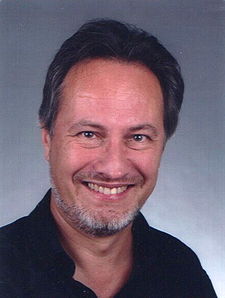- Oscar Nierstrasz
-
Oscar Marius Nierstrasz 
Born October 15, 1957 Residence Switzerland Citizenship Canada and The Netherlands Fields Computer Science Institutions University of Toronto, Université de Genève, University of Berne Alma mater University of Toronto Oscar Marius Nierstrasz, born October 15, 1957, is a Professor at the Computer Science Institute (IAM) at the University of Berne. He is active in the field of
- programming languages and mechanisms to support the flexible composition of high-level, component-based abstractions, and
- tools and environments to support the understanding, analysis and transformation of software systems to more flexible, component-based designs.[1]
He has led the Software Composition Group at the University of Bern since 1994 to date (September 2010).[2]
CyberChair, an Online Submission and Reviewing System, is based on Oscar Nierstrasz's publication called Identify the champion,[3] where he described the peer review process for contributions to scientific conferences using an organizational pattern language.[4]
Nierstrasz co-authored several books such as Object-Oriented Reengineering Patterns[5] and Pharo by Example.[6]
References
- ^ Introduction to Oscar Nierstrasz as a keynote speaker at the European Software Engineering Conference (ESEC/FSE 2005): [1]
- ^ http://scg.unibe.ch/download/oncv/oncv.pdf
- ^ Oscar Nierstrasz, Identify the Champion, In: Pattern Languages of Program Design 4, N. Harrison, B. Foote, H. Rohnert (Ed.), vol. 4, Addison Wesley, 2000, pp. 539-556, http://scg.unibe.ch/download/champion/
- ^ Richard R. van de Stadt, CyberChair - An Online Submission and Reviewing System, or: A Program Chair's Best Friend
- ^ Serge Demeyer, Stéphane Ducasse, and Oscar Nierstrasz. Object-Oriented Reengineering Patterns, Square Bracket Associates, 2008, [2]
- ^ Andrew Black, Stéphane Ducasse, Oscar Nierstrasz, Damien Pollet, Damien Cassou, and Marcus Denker. Pharo by Example, Square Bracket Associates, 2009, [3]
External references
Software engineering Fields Concepts Orientations Models Development modelsOther models- Automotive SPICE
- CMMI
- Data model
- Function model
- Information model
- Metamodeling
- Object model
- Systems model
- View model
Modeling languagesSoftware
engineers- Kent Beck
- Grady Booch
- Fred Brooks
- Barry Boehm
- Ward Cunningham
- Ole-Johan Dahl
- Tom DeMarco
- Martin Fowler
- C. A. R. Hoare
- Watts Humphrey
- Michael A. Jackson
- Ivar Jacobson
- Craig Larman
- James Martin
- Bertrand Meyer
- David Parnas
- Winston W. Royce
- Colette Rolland
- James Rumbaugh
- Niklaus Wirth
- Edward Yourdon
- Victor Basili
Related fields Categories:- 1957 births
- Living people
- University of Toronto alumni
- Software engineering researchers
- Programming language researchers
- Computer science writers
- University of Bern faculty
Wikimedia Foundation. 2010.
